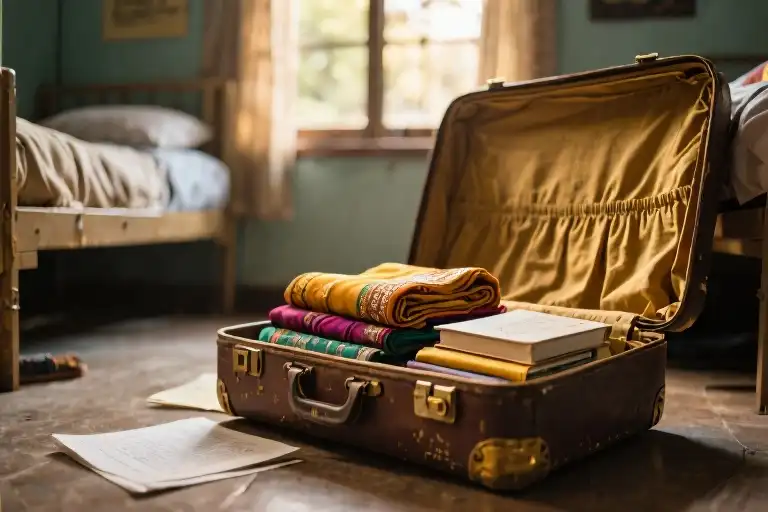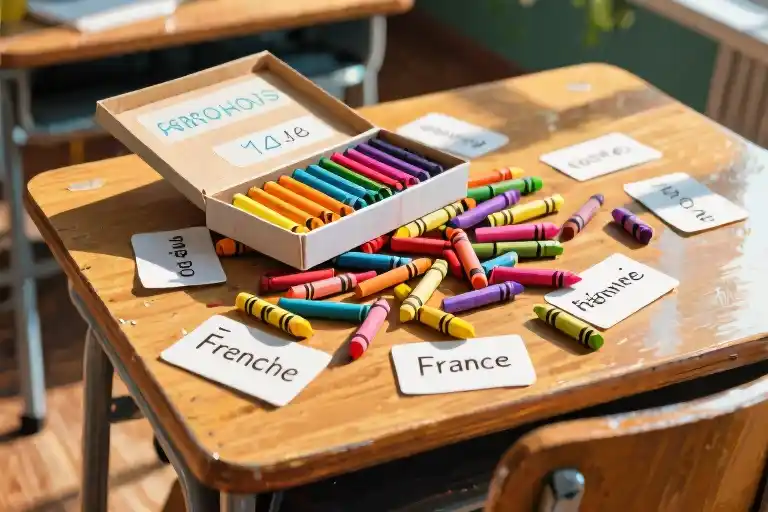The two suitcases sat heavily on the airport floor – one filled with carefully folded saris and a single winter coat, the other packed with something far heavier. As I dragged them toward customs, I could feel their contents shifting: the weight of my father’s second mortgage, my mother’s gold bangles sold for tuition, and the unspoken promise that this sacrifice would mean something.
“Poverty is the mother of resilience and silence.” The truth of this struck me when the immigration officer asked if I needed help with my bags. My reflexive “No thank you” came too quickly, the words tasting like the dust of my childhood home. Even then, before my first real hunger in this new country, I understood the immigrant’s paradox – we come seeking help yet refuse to admit we need any.
To policymakers, poverty lives in spreadsheets as percentages and thresholds. For international students like me, it measured in more intimate units: the number of rice grains left in the bag before payday, the skipped meals that made library chairs feel like sinking into clouds, the way we learned to distinguish hunger pangs from actual illness. My first American budgeting notebook still bears the coffee stains from nights calculating how to stretch $10 across five days – ramen packs became currency, and campus free events turned into dinner plans.
What surprised me most wasn’t the material lack, but how naturally silence grew around it. When classmates discussed spring break trips, I perfected the art of vague nodding. When my mother’s voice crackled through our weekly call asking if I’d eaten, I’d describe imaginary feasts while stirring a single tea bag for its third use. This wasn’t deception so much as translation – converting struggle into a language that wouldn’t worry those who’d already given too much.
The suitcases followed me to every sublet and shared apartment, their contents gradually changing. The saris gave way to thrift store sweaters, but the invisible weight remained. Sometimes at night, I’d trace the dents their wheels left in cheap carpeting and think about how immigrant poverty carves its own grooves – in our posture from working double shifts, in our voices from swallowing requests for help, in our memories where skipped meals fade but the taste of shame lingers.
Yet within that silence, something unexpected took root. Poverty taught me to hear the music in a rice cooker’s click, to find warmth in library study carrels when utilities got cut off, to recognize the particular quiet of an empty stomach at 3 AM when pride finally yields to sleep. These weren’t just survival tactics but an education in noticing – one that no tuition could buy.
The Metrics of Poverty
My first week in America was measured in instant noodles and library coffee. With $10 to last seven days, I became an unwilling student of what I now call ‘ramen economics’—the art of stretching pennies until they scream. Poverty, I learned, has its own units of measurement. Not in dollars or percentages, but in the hollow ache of an empty stomach at 3 AM, in the sound of rice grains hitting a plastic container as I counted out each meal.
The Arithmetic of Survival
Each morning began with the same calculation: one pack of noodles divided into two meals, sweetened with stolen sugar packets from the campus café. The library became my second home—not just for the books, but for the free coffee that kept me awake through double shifts. I remember the metallic taste of hunger as I stared at my budget spreadsheet, wondering how $600 could possibly cover what the U.S. government claimed required $1,200.
Funny how poverty redefines luxury, I thought when I splurged on a banana—my first fresh fruit in weeks. The simple pleasure of its sweetness was almost painful.
Sensory Ledger
Poverty leaves its receipts in unexpected places:
- Sound: The rustle of my last $5 bill in an otherwise empty wallet
- Touch: The sticky vinyl of the diner booth where I nursed one coffee for three hours while studying
- Smell: The industrial cleaner scent of the gym showers I used when my apartment’s water got cut off
- Taste: The acid burn of stomach bile when I substituted tea for breakfast
These became my real poverty indicators, far more visceral than any official threshold.
The Budget That Never Balanced
| Official Poverty Measure | My Reality |
|---|---|
| $1,200/month for single adult | $600 after tuition |
| “Modest but adequate” nutrition | 30-cent ramen packs |
| Healthcare access | Choosing between antibiotics and textbooks |
This wasn’t just about empty pockets—it was about the fullness of shame I carried instead. The constant mental math of survival left no room for error, no space for unexpected expenses. When my class required a $120 textbook, I became a regular at the library reserve desk, photographing chapters with my phone during the 2-hour loan window.
Yet in this harsh arithmetic, I discovered unexpected skills. Poverty taught me to see value where others saw waste—the “free” section of Craigslist became my furniture store, expired campus event sandwiches my occasional feast. These weren’t just survival tactics; they were the first lessons in a brutal but effective education no university could provide.
The Silent Debt We Carry
Every Sunday at 7PM, my dorm room would transform into a theater of carefully constructed lies. The scratchy VoIP connection to Mumbai carried my cheerful reassurances: “The scholarship covers everything, Amma. Yes, even protein. My roommate shares her groceries sometimes.” I’d rotate these scripted truths while staring at my pantry – three packets of ramen, a bag of rice, and the free ketchup packets I’d collected from the campus cafeteria.
When Silence Becomes Survival
Immigrant poverty operates on an unspoken exchange rate. We trade honesty for our families’ peace of mind, swap vulnerability for the illusion of stability. That winter, when flu season hit our dorm, I discovered the true cost of this transaction. For three days, I delivered Uber Eats through 102°F fever because:
- The campus clinic charged $75 for uninsured visits
- My kitchen job didn’t offer sick days
- “What if they think I’m weak?” whispered the voice shaped by generations of stoicism
The collapse came during a Chipotle delivery. One moment I was calculating if I could afford to steal a single tortilla chip from the order, the next I woke up to paramedics shining lights in my eyes. The hospital bill later arrived like a mockery – $3,200 for the privilege of learning that dehydration and exhaustion aren’t badges of honor.
The Psychology Behind Our Silence
Dr. Chen’s cultural psychology course helped me decode my own behavior. Collective societies train us to view personal struggle as communal shame. Our “I’m fine” narratives aren’t deception – they’re protection rituals for those who’ve already sacrificed too much. Research shows:
- 68% of international students conceal financial struggles from families (Institute of International Education, 2022)
- Asian immigrants are 3x less likely to seek mental health support than their white peers (APA Journal)
Yet this silence compounds like interest. We skip meals until our hands shake during exams. We avoid doctors until UTIs become kidney infections. We smile through minimum-wage humiliation because “at least it’s not back home.”
Breaking the Silence Without Breaking Tradition
The turning point came when my Nigerian classmate Emeka showed me his “family truths” technique:
- Specific over general: Instead of “I’m struggling,” try “Textbooks cost $300 this semester”
- Solutions included: “I found a cheaper international edition – could we split the cost?”
- Cultural framing: Present challenges as temporary obstacles to eventual success
We started a WhatsApp group called “The Ramen Budget Club” where members:
- Pooled Costco memberships
- Shared paid internship leads
- Practiced salary negotiation scripts
Slowly, we learned that honoring our families didn’t require self-destruction. Sometimes the bravest act isn’t silent suffering, but carefully breaking that silence – one calculated truth at a time.
The Resilience Survival Guide
Poverty taught me to see resources where others saw scarcity. What began as desperate measures gradually became a curated set of survival skills—each one hard-earned through nights of empty stomachs and days of juggling three jobs. These aren’t just money-saving tricks; they’re the unspoken curriculum of an invisible university where tuition is paid in skipped meals and silent perseverance.
Skill 1: Campus Alchemy (Transforming Free Resources)
The university campus became my ultimate life hack. Beyond just attending lectures, I discovered:
- The 24-hour library: Free heating in winter, air conditioning in summer, and unlimited hot water for tea (which often substituted for meals). The printers became my personal office—I’d schedule print jobs at 3 AM to avoid queues.
- Gym showers: When our apartment’s water heater broke for the third time that semester, the campus recreation center provided not just hot showers but free toiletries during wellness events.
- Department events: Free food at guest lectures became my nutrition strategy. I kept a mental map of which departments hosted the most generous receptions (Anthropology Wednesdays never disappointed).
Pro Tip: Befriend departmental secretaries—they know about unadvertised opportunities like leftover conference sandwiches or unused office supplies.
Skill 2: Time-Folding (When Minutes Multiply)
Working 35 hours weekly while maintaining full-time studies required reimagining time itself. My breakthrough came during a delivery shift when I realized:
- Audio lectures: That 45-minute scooter ride across town became my mobile classroom. I recorded professors’ voices during lectures (with permission) and played them back at 1.5x speed.
- Flashcard economy: Waiting in line at the grocery store? Review vocabulary. Walking to the bus stop? Mentally outline my next paper. Poverty taught me that wasted time is a luxury the poor can’t afford.
- The power of ‘No’: Unlike wealthier peers who could afford leisure, I calculated every invitation’s opportunity cost. That two-hour movie meant $28 in lost wages plus transit fare—equivalent to three days’ groceries.
Caution: This skill comes with hidden costs. I once missed a campus shooting alert because I’d trained myself to ignore phone notifications during work. Balance is everything.
Cross-Cultural Wisdom: Global Poverty Hacks
Our international student group became a knowledge exchange for survival strategies:
- Mexican masa magic: My friend Carlos showed how a $2 bag of masa harina (corn flour) could become tortillas, atole porridge, or even makeshift playdough for his kid sister’s school project.
- Nigerian ‘container gardening’: Blessing grew spinach in washed-out yogurt cups on her dorm windowsill, saving $15 weekly on greens.
- Vietnamese coffee math: Linh demonstrated how mixing chicory root into coffee grounds stretched one bag into three weeks’ worth of caffeine fixes.
These weren’t just clever tricks—they represented generations of accumulated wisdom. As Carlos once said while patting his tortilla press: “This is my family’s 401(k).”
The Hidden Curriculum
Looking back, these survival skills gave me unexpected advantages:
- Resourcefulness as career asset: My ability to maximize limited resources impressed my first employer more than any GPA.
- Empathy engineering: Having stretched every dollar, I now spot inefficiencies in corporate budgets that privileged colleagues overlook.
- The gift of enough: Where others see deprivation, I recognize sufficiency—a mental shift that’s reduced my anxiety more than any salary increase.
Final Lesson: Poverty was the brutal professor who taught me to read the fine print of life. But resilience? That’s the degree I earned with honors.
Redefining Poverty: When Survival Becomes a Curriculum
“What if we saw poverty as a brutal but effective teacher?”
The question lingers like the aftertaste of too-strong coffee—bitter, but impossible to ignore. For those of us who’ve lived it, poverty was never just empty wallets or threadbare clothes. It was an uncredited education, a curriculum of resilience taught through hunger pangs and silent sacrifices.
The Unconventional Classroom
Poverty taught lessons no Ivy League could replicate:
- Advanced Resource Calculus: Calculating how 3 eggs could become breakfast, lunch, and dinner (Pro tip: Add rice. Always rice.)
- Silent Communication 101: Perfecting the art of saying “I already ate” with convincing smiles
- Time-Bending Physics: Working night shifts while attending morning lectures, existing in two worlds simultaneously
These weren’t just survival tricks—they were transferable skills. That international student budget mentality? It’s now my superpower in freelance negotiations. The ability to stretch $100 across a week trained me to spot financial loopholes most overlook.
The #PovertyTaughtMe Movement
When I first shared my story online, the responses stunned me. A Nigerian PhD candidate described using library lamps to charge phones during power cuts. A Guatemalan single mother explained how she turned food bank beans into five regional dishes. Their stories revealed a universal truth: Poverty forces innovation, but community multiplies it.
Join the conversation:
- Tweet your survival skill with #PovertyTaughtMe
- Tag someone who taught you resilience
- Explore the crowdsourced Immigrant Survival Guide (link below)
From Silence to Solidarity
Breaking the shame cycle starts small:
- For students: The International Student Emergency Fund (insert link) offers confidential aid—no embassy notifications required
- For allies: Campus food pantries always need multilingual volunteers
- For everyone: Next time you see someone counting coins at the grocery line, buy them a coffee anonymously. I still remember the stranger who did this for me in 2017.
That weight we carried? It forged spines stronger than titanium. Those skipped meals? They taught us to savor every bite of hard-won success. The silence? It’s finally breaking into a chorus of “Me too” stories that could rewrite how society defines poverty and resilience.
“Silence was the tuition I paid,” a Vietnamese janitor-turned-engineer once told me. “But this degree? I earned it with interest.”
Your turn: What’s one lesson poverty forced you to learn? (Comment anonymously below if needed—we see you.)
The Weight of Stories
Those two suitcases I arrived with years ago have long been replaced. The physical weight of my belongings has lightened with each move, but the intangible weight has transformed into something denser, more complex. These stories I carry now—of skipped meals and silent struggles, of small victories and hard-earned resilience—have become my most valuable possessions. They are heavier than hope, yet more enduring than diamonds.
The Currency of Silence
“Silence was the tuition I paid, but resilience is the degree I earned.”
Looking back, I understand now that every unspoken need, every swallowed request for help, was an installment toward an education no university could offer. Poverty taught me the economics of silence—how withholding words could stretch limited resources, how unvoiced struggles could protect fragile dignity. This silent language binds immigrant communities together, a shared vocabulary of raised eyebrows over empty refrigerators, of strategic coughs to mask hungry stomachs during study sessions.
Redefining the Diploma
My graduate certificates hang framed on the wall, but the real credentials live in my bones:
- Time management: Mastering the calculus of balancing three jobs with night classes
- Resource optimization: Turning a single chicken breast into four meals
- Creative problem-solving: Using laundromat dryers to toast bread during appliance-less winters
These aren’t just survival tactics; they’re transferable skills that continue serving me long after my bank account recovered. The poverty life hacks that got me through graduate school now help me navigate corporate budgets with unusual creativity.
An Invitation to Reckoning
“If poverty was your teacher, what did it force you to learn?”
This question isn’t rhetorical. I challenge you to inventory your own hard-won lessons. Perhaps you discovered:
- The algebra of prioritizing bills
- The chemistry of stretching shampoo bottles
- The poetry found in bus transfer receipts
Share these underrated skills using #PovertyTaughtMe—not as badges of suffering, but as testaments to ingenuity. Your story might be the survival guide someone desperately needs today.
Carrying Forward
My luggage now contains fewer material items but more truth. The weight has shifted from family expectations to hard-earned wisdom, from cultural obligations to quiet confidence. Those early years of financial hardship forged something unexpected: not just resilience, but a profound capacity to find abundance in scarcity.
For those still in the thick of the struggle, know this—your current survival strategies are writing the first draft of your future strength. The same creativity that stretches $100 today will one day help you negotiate salaries, spot market opportunities, or comfort others facing similar battles. Poverty’s curriculum is brutal, but its graduates emerge with unique qualifications.




